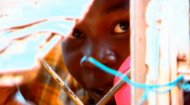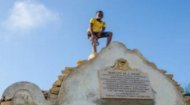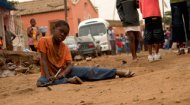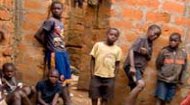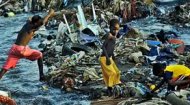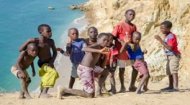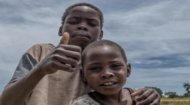|
Today Angola, with its population is about half at 39 million (2025), is ruled by the People's Movement for the Liberation of Angola who has won all elections since independence, albeit it with a dwindling majority. The current president of Angola is João Lourenço. He also serves as the head of state and head of government, having assumed the presidency on September 26, 2017. Still recovering from decades of war, the country faces many acute problems, not least being the landmines that litter the landscape, presenting an imminent danger to transport and life there. In fact, visitors are strongly advised not to even venture outside the capital city of Luanda.
Beyond these two giants, Angola possesses considerable reserves of iron ore, phosphates, copper, gold, and bauxite. However, the over-reliance on oil has made the economy vulnerable to global price fluctuations, highlighting the urgent need for diversification. The government has made concerted efforts to promote other sectors, especially agriculture, which holds immense potential. Angola was once a significant exporter of coffee, cotton, and sisal, and its fertile lands are suitable for cultivating maize, sugarcane, and various food crops. However, this sector remains largely underdeveloped due to decades of neglect, landmine contamination, and insufficient investment. Challenges persist, including high unemployment, significant income inequality, and the lingering effects of corruption that have historically diverted public funds. While there have been improvements in governance and transparency in recent years, the journey towards a truly diversified and equitable economy is ongoing. In terms of a social profile, Angola is a country of immense demographic and cultural diversity. Its population is predominantly young, with a rich tapestry of ethnic groups, including the Ovimbundu, Kimbundu, Bakongo, and Chokwe, among others, each contributing unique languages, traditions, and customs. Portuguese is the official language, a legacy of colonial rule, and serves as a vital lingua franca across the country, though numerous indigenous Bantu languages are widely spoken. |
Angola Profile |
Angola Profile |
Angola Profile | Angola Profile |
Facts, figures and video with details of projects and programs supporting street children in Angola.
More >
A video documentary about the situation of refugees from Angola who are living in refugee camps.
More >

|
Angolan culture is a captivating blend of African heritage and Portuguese influence. Music and dance are central to daily life, with genres like Kizomba and Semba gaining international recognition. Kizomba, characterized by its sensual rhythm and partner dance, originated in Angola and embodies the country's romantic spirit. Cuisine is equally vibrant, featuring dishes like moamba de galinha (chicken palm oil stew), funge (a staple made from cassava or corn flour), and a variety of fresh seafood along the coast. Daily life varies significantly between the bustling capital of Luanda and the more rural provinces. Luanda, a rapidly modernizing and notoriously expensive city, is a hub of commerce, government, and cosmopolitan living, characterized by its vibrant markets, traffic, and high-rise buildings. In contrast, rural areas often maintain more traditional lifestyles, with communities centered around agriculture and traditional customs, though access to modern amenities like clean water, electricity, and healthcare remains a significant challenge. Education and healthcare infrastructure have seen considerable investment since the war, but vast disparities between urban and rural areas, and between the wealthy and the poor, continue to be pressing social concerns. Despite its remarkable progress since 2002, Angola continues to grapple with significant challenges. Economically, the over-reliance on oil, coupled with global price volatility, highlights the urgent need for robust diversification and the creation of sustainable jobs for its rapidly growing young population. High levels of unemployment, particularly among youth, and persistent inflation are ongoing concerns. Efforts to combat corruption and improve governance are crucial for fostering a more transparent and attractive investment environment. Socially, addressing poverty, reducing inequality, and ensuring equitable access to quality education, healthcare, and basic services remain paramount. The legacy of the civil war, including unexploded landmines in many rural areas, continues to pose a threat to agricultural development and community safety. Environmentally, the country faces issues like deforestation, desertification, and the challenge of poaching, especially in its national parks. However, Angola also possesses immense opportunities. Its vast natural resources, strategic geographic location, and a dynamic, young population represent powerful engines for future growth. Reforms aimed at improving economic transparency, promoting private sector investment, and developing human capital are slowly but surely laying the groundwork for a more stable and prosperous future. For the adventurous traveler, Angola offers an astonishing array of natural wonders and historical sites, largely untouched by mass tourism: Kissama National Park: Located just south of Luanda, this park is a remarkable conservation success story. Decimated during the civil war, its wildlife has been dramatically reintroduced, making it a fantastic destination for safaris, especially for spotting elephants, and various antelope species. Angola is in 148th place out of 193 countries and territories in 2025 when ranked in terms of life expectancy, literacy, access to knowledge and the living standards of a country with a life expectancy for males and females at a low 64.62 years (2023). Half of all children in Angola live below the poverty line, just 51% of the child population has access to safe water supplies and 16% of all children are underweight. Yet, despite a high level of disease and low take up rates of education, improvements are being felt across the country as stability takes hold. Despite this, there are thousands of children living on the streets of Luanda, living in extreme poverty and at risk of emotional, physical and sexual exploitation. In fact, nearly all children across Angola have been affected by the decades of war, facing displacement, violence, starvation and the loss of family members, scarring them for life. |

 Angola's economic profile is overwhelmingly dominated by its vast natural resources, particularly oil and diamonds. As one of Africa's leading oil producers and a member of OPEC, petroleum accounts for the majority of the country's GDP, government revenue, and exports. This oil wealth has fueled significant infrastructure development since the end of the civil war, transforming cities like Luanda with new roads, buildings, and essential services. Diamond mining is another significant contributor to the national coffers, primarily concentrated in the northeastern Lunda provinces.
Angola's economic profile is overwhelmingly dominated by its vast natural resources, particularly oil and diamonds. As one of Africa's leading oil producers and a member of OPEC, petroleum accounts for the majority of the country's GDP, government revenue, and exports. This oil wealth has fueled significant infrastructure development since the end of the civil war, transforming cities like Luanda with new roads, buildings, and essential services. Diamond mining is another significant contributor to the national coffers, primarily concentrated in the northeastern Lunda provinces.
